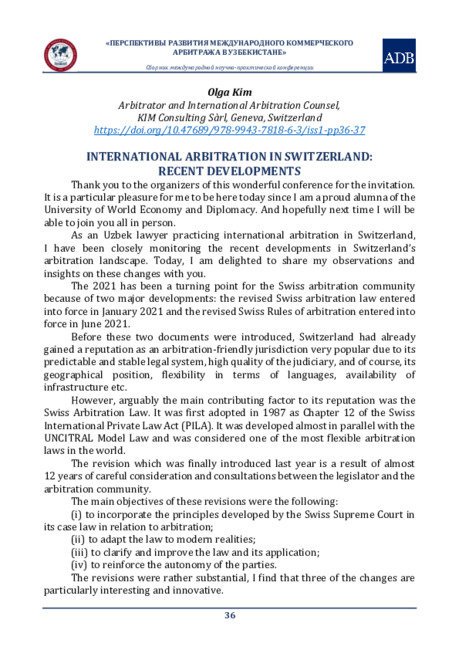
«ПЕРСПЕКТИВЫ РАЗВИТИЯ МЕЖДУНАРОДНОГО КОММЕРЧЕСКОГО
АРБИТРАЖА В УЗБЕКИСТАНЕ»
Сборник международной научно-практической конференции
36
Olga Kim
Arbitrator and International Arbitration Counsel,
KIM Consulting Sàrl, Geneva, Switzerland
https://doi.org/10.47689/978-9943-7818-6-3/iss1-pp36-37
INTERNATIONAL ARBITRATION IN SWITZERLAND:
RECENT DEVELOPMENTS
Thank you to the organizers of this wonderful conference for the invitation.
It is a particular pleasure for me to be here today since I am a proud alumna of the
University of World Economy and Diplomacy. And hopefully next time I will be
able to join you all in person.
As an Uzbek lawyer practicing international arbitration in Switzerland,
I have been closely monitoring the recent developments in Switzerland’s
arbitration landscape. Today, I am delighted to share my observations and
insights on these changes with you.
The 2021 has been a turning point for the Swiss arbitration community
because of two major developments: the revised Swiss arbitration law entered
into force in January 2021 and the revised Swiss Rules of arbitration entered into
force in June 2021.
Before these two documents were introduced, Switzerland had already
gained a reputation as an arbitration-friendly jurisdiction very popular due to its
predictable and stable legal system, high quality of the judiciary, and of course, its
geographical position, flexibility in terms of languages, availability of
infrastructure etc.
However, arguably the main contributing factor to its reputation was the
Swiss Arbitration Law. It was first adopted in 1987 as Chapter 12 of the Swiss
International Private Law Act (PILA). It was developed almost in parallel with the
UNCITRAL Model Law and was considered one of the most flexible arbitration
laws in the world.
The revision which was finally introduced last year is a result of almost
12 years of careful consideration and consultations between the legislator and the
arbitration community.
The main objectives of these revisions were the following:
(i)
to incorporate the principles developed by the Swiss Supreme Court in
its case law in relation to arbitration;
(ii)
to adapt the law to modern realities;
(iii)
to clarify and improve the law and its application;
(iv)
to reinforce the autonomy of the parties.
The revisions were rather substantial, I find that three of the changes are
particularly interesting and innovative.

«ПЕРСПЕКТИВЫ РАЗВИТИЯ МЕЖДУНАРОДНОГО КОММЕРЧЕСКОГО
АРБИТРАЖА В УЗБЕКИСТАНЕ»
Сборник международной научно-практической конференции
37
1.
Scope of application.
– Before the law provided that it would apply in cases where at least one of
the parties had domicile or residence outside of Switzerland at the time of
commencement of arbitration. Now it is sufficient to have a domicile or residence
outside of Switzerland when the arbitration agreement was concluded
2.
The language of challenge submissions.
– Challenge submissions as previously must be filed to the Supreme Court
however now the Parties are allowed to file documents in English.
– As you know, Switzerland has four official languages, German, French,
Italian and Romansh.
– This measure was introduced to promote further the openness of the Swiss
system to international arbitration since most of the proceedings are held in English.
– It also makes sense because now the law establishes that the awards must
be challenged in 30 days and this time limit cannot be extended in any case.
3.
Direct access to Swiss courts.
– Foreign arbitral tribunals that need court assistance in Switzerland in
provisional or protective measures or in taking evidence – can make a direct request
without going through the international mutual assistance in civil matters.
Swiss Rules of International Arbitration.
The Swiss Rules of International Arbitration were originally introduced in
2004 and were based on the UNCITRAL Model Arbitration Rules.
In 2012, the Swiss Rules were amended to introduce an emergency
arbitrator procedure, which has been a big success so far.
In 2021, the decision was made to convert the Swiss Chambers’ Arbitration
Institution into the Swiss Arbitration Centre. This change reflected the enhanced role of
the institution, for example, now all communications must be copied to the Secretariat,
it can hold an advance on cost and it now notifies the award to the parties.
The Rules also addressed such issues as the digitalisation of the process and
the rules on cyber security and an increased emphasis on mediation.
The arbitrators have received the right to oppose the appointment of a new
counsel at a later stage of the proceedings, which should allow the tribunals to
avoid procedural incidents and potential challenges at the stage of enforcement.
The approach to administrative costs has changed as well. Thus, for
example, no admin costs are charged for arbitration with an amount in dispute
lower than CHF 300,000.
The Swiss Chambers’ Arbitration Institution has evolved into the Swiss
Arbitration Centre. The Centre has now the Board of Directors and a Court. There
are currently 25 members of the Court who are all experienced arbitration
practitioners based in Switzerland and abroad. The Centre’s Secretariat includes
Case Administration Committees and a Special Committee which makes such
procedural decisions as determination of the seat or consolidation of the
proceedings.






